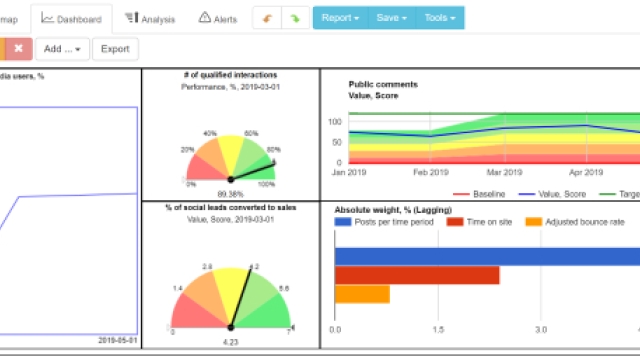In today’s dynamic business world, one of the key factors to achieving long-term success is the ability to measure and assess performance effectively. This is where Key Performance Indicators (KPIs) come into play – they provide valuable insights into various aspects of a business’s performance and help drive strategic decision-making. However, simply implementing KPIs is not enough. To truly unlock business success, companies must master the art of refining their KPIs, ensuring they are meaningful, relevant, and aligned with their overall goals.
Refining KPIs is a process that involves evaluating, redefining, and optimizing the metrics that are used to track performance. It goes beyond just selecting a few indicators based on industry benchmarks or gut feelings. It requires a deep understanding of the business, its objectives, and the specific areas that need improvement. By refining KPIs, organizations can gain a clearer understanding of their strengths and weaknesses, identify areas for growth, and measure progress towards desired outcomes.
To refine KPIs effectively, it is essential to start with a solid foundation. This involves clearly defining the objectives and goals of the business, and then aligning the KPIs with these objectives. Each KPI should be tied to a specific goal and provide actionable information that can help drive decision-making. It’s important to focus on quality rather than quantity – having too many KPIs can lead to confusion and dilute the overall effectiveness of the measurement process.
In addition to alignment with goals, KPIs should also be relevant and meaningful for the business. This means selecting metrics that truly reflect the performance and progress of the organization. It may involve regularly reassessing and modifying the KPIs to keep them up-to-date with changing market conditions and business priorities. By refining KPIs in this way, companies can ensure they are measuring what truly matters and avoid being overwhelmed by irrelevant data.
Another crucial aspect of refining KPIs is establishing a consistent and reliable measurement process. This involves collecting accurate data, analyzing it effectively, and reporting the findings in a clear and concise manner. Depending on the nature of the business, this may involve leveraging technology and automation tools to streamline data collection and analysis. By establishing a robust measurement process, organizations can ensure the validity and reliability of their KPIs, making them a valuable tool for decision-making.
In conclusion, refining KPIs is an essential part of unlocking business success. By aligning them with goals, ensuring their relevance, and establishing a reliable measurement process, companies can derive actionable insights from their KPIs and make informed decisions that drive growth and progress. It is an ongoing process that requires continuous evaluation and adaptation to stay relevant and effective in an ever-changing business landscape. So, let’s dive in and master the art of refining KPIs to take our businesses to new heights.
Understanding Key Performance Indicators

Key Performance Indicators, or KPIs, play a vital role in measuring the success and progress of businesses. They are quantifiable metrics that provide valuable insights into various aspects of a company’s performance. By monitoring and refining these KPIs, organizations can effectively evaluate their strategies, identify areas for improvement, and drive overall growth.
The first step in unlocking the potential of KPIs is understanding their significance. KPIs act as performance markers, helping businesses track and assess their progress towards achieving specific goals or objectives. They serve as a compass, guiding decision-makers by providing data-driven insights that facilitate informed and strategic choices.
Refining KPIs is essential to ensure that they accurately reflect the unique circumstances and priorities of each organization. By tailoring KPIs to specific departments or functions, businesses can obtain more granular insights and align their efforts towards specific targets. This customization enables companies to focus on the most critical areas, ensuring that their resources and efforts are channeled effectively.
Moreover, refining KPIs allows companies to adapt to evolving business landscapes. As market conditions change and new challenges arise, KPIs need to be adjusted accordingly to remain relevant and informative. Regular evaluation and refinement of KPIs ensure that businesses are measuring the right metrics and capturing the most accurate picture of their performance.
In conclusion, understanding and refining KPIs are indispensable practices for businesses seeking success. By harnessing the power of these metrics and tailoring them to their specific needs, organizations can gain valuable insights, make informed decisions, and propel themselves towards growth and achievement.
Guidelines for Effective KPI Refinement
To ensure the effectiveness of Key Performance Indicators (KPIs), it is important to have a systematic approach to their refinement process. By following these guidelines, businesses can enhance the relevance and reliability of their KPIs, ultimately driving improved decision-making and business success.
Set Clear Objectives: Before refining KPIs, it is vital to establish clear objectives that align with the overall business strategy. By clearly defining what is to be achieved, businesses can focus on identifying relevant KPIs that will provide meaningful insights.
Continuous ImprovementPrioritize Relevance: Not all KPIs are created equal, and it is essential to prioritize those that truly matter. As part of the refinement process, businesses should assess the relevance of each KPI to ensure they are closely aligned with the objectives and capture the critical aspects of performance. By focusing on the most relevant KPIs, businesses can avoid diluting their efforts and ensure they are tracking the metrics that truly matter.
Regular Review and Calibration: KPIs should not be set in stone; they should be regularly reviewed and calibrated to reflect changing business dynamics. Businesses should establish a schedule for reviewing KPIs and make adjustments as needed to account for new challenges, opportunities, and shifting priorities. Regular calibration will help businesses stay agile and responsive to the ever-changing business landscape.
By following these guidelines for effective KPI refinement, businesses can unlock the true potential of their performance measurement systems. With well-defined objectives, relevant KPIs, and a commitment to ongoing review and calibration, businesses can make more informed decisions and drive continuous improvement towards their organizational goals.
Implementation and Monitoring of Refined KPIs
Refining KPIs is just the first step towards achieving business success; the true value lies in the implementation and monitoring of these metrics. Without proper execution and ongoing measurement, the effort put into refining KPIs may go to waste.
To effectively implement refined KPIs, it is crucial to communicate the objectives and expectations clearly across the organization. This ensures that everyone is aligned with the new metrics and understands how their individual performance contributes to the overall goals. It is important to emphasize that refining KPIs is not meant to create unnecessary pressure or competition, but rather to provide a clear direction for improvement.
Regular monitoring of refined KPIs is vital to measure progress and identify any gaps or areas for improvement. This involves collecting and analyzing the relevant data and using it to gain insights into the performance of different teams or departments. With the right tools and technology in place, businesses can automate the monitoring process, making it easier to track KPIs in real-time and make data-driven decisions.
Implementing and monitoring refined KPIs requires ongoing commitment and dedication. It is important to regularly review and assess the relevance of the metrics being tracked to ensure they are still aligned with the business objectives. By continually refining and adapting the KPIs based on the changing needs of the organization, businesses can enhance their decision-making capabilities and drive continuous improvement.
Remember, refining KPIs is not a one-time task. It is an ongoing process that requires active involvement and engagement from all levels of the organization. By embracing a culture of continuous improvement and leveraging refined KPIs to guide strategic decision-making, businesses can unlock their full potential and pave the way to long-term success.


